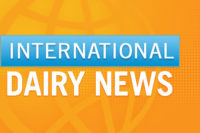On September 24, the dairy industry will make history signing a “Global Dairy Agenda for Action” during the World Dairy Summit in Berlin, Germany.
Signed by seven organizations on behalf of the world’s dairy associations and companies, the “Global Dairy Agenda for Action” is an industry pledge to reduce carbon emissions as part of its contribution to help address global warming. This pledge builds on past performance to address climate change.
The global dairy industry has a shared interest with governments and the global community to produce nutritious food for today and for future generations in a sustainable way.
The declaration also seeks the support of policy makers to provide a supportive regulatory policy environment that recognizes the important economic, social and environmental contributions of the dairy industry.
“This Agenda for Action represents an unprecedented level of cooperation across national borders and along the dairy supply chain. The global dairy community and its partners have pooled resources, knowledge and projects to achieve a more sustainable future,” said Povl Krogsgaard, deputy managing director of Arla Foods, on behalf of Global Dairy Platform.
“From production of feed for dairy cows to processing, packaging and distribution of milk, many elements contribute to the dairy industry’s commitment to reducing greenhouse gases,” said Richard Doyle, president of the International Dairy Federation. “It makes good sense to reduce GHG emissions - it saves money and improves efficiency in production. This initiative encourages and shares new and innovative technologies and practices for including energy efficiencies on our farms, by food manufacturers and in our warehouses.”
In order to facilitate the industry’s efforts to reduce GHG and promote the long term sustainable supply of milk and dairy products, the “Global Dairy Agenda for Action” is a five-point commit to:
1. Promote the development of a standard methodology framework for assessing the carbon footprint of milk and dairy products based on robust science;
2. Promote adoption of world’s best practices within the global dairy sector and actions that:
a. lead to the reduction of global GHG from dairy production on a per unit of production basis,
b. promote the use of technologies and methods that improve the processing and distribution efficiency of dairy products,
c. optimize economic, environmental and social outcomes for global dairy stakeholders,
d. recognize different levels of development and local conditions,
e. build on existing frameworks and knowledge, including for scientific advancement and technology transfer,
f. promote decision making based on robust science, and
g. complement initiatives in other areas of sustainability.
3. Advance the establishment of tools to facilitate measurement and monitoring of emissions both on-farm and in dairy manufacturing;
4. Promote improved farmer understanding of agricultural emissions and opportunities to reduce greenhouse gas emissions on farm; and,
5. Support sharing information and aligning research efforts to develop cost effective mitigation technologies for both on farm and manufacturing applications.
The declaration is being signed by Eastern and Southern African Dairy Association; European Dairy Association; Pan-American Dairy Federation; Global Dairy Platform; International Dairy Federation; International Federation of Agriculture Producers; and Sustainable Agricultural Initiative Platform.
Dairy industry participants have already begun action in areas like emissions reduction, energy efficiency, transportation efficiency, reduction in loss of milk and milk products, resource efficiency and life cycle analysis and management. These individual activities are not specifically defined in the declaration, but they continue to be major initiatives for the dairy industry throughout the world.
Get our new eMagazine delivered to your inbox every month.
Stay in the know on the latest dairy industry trends.
SUBSCRIBE TODAYCopyright ©2024. All Rights Reserved BNP Media.
Design, CMS, Hosting & Web Development :: ePublishing


